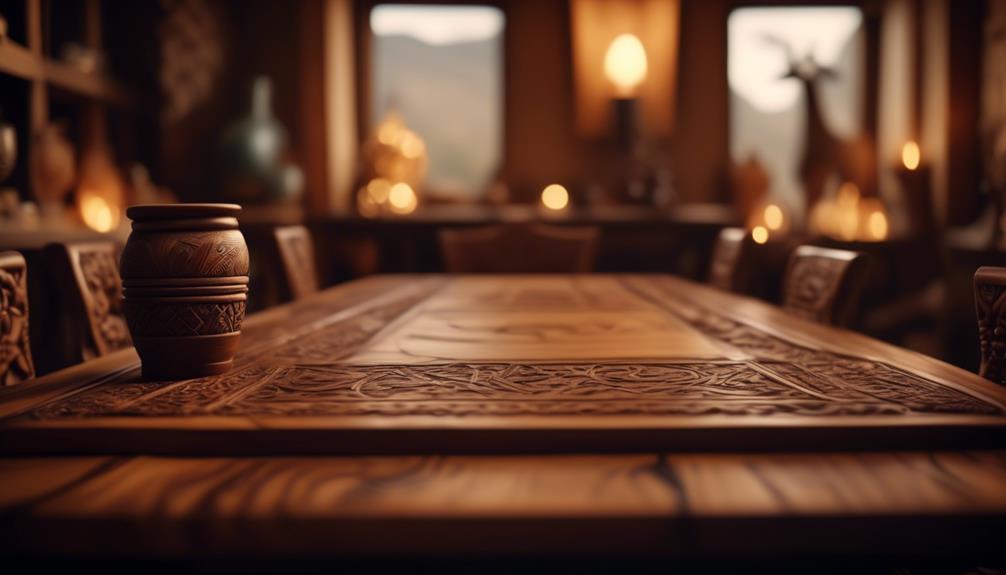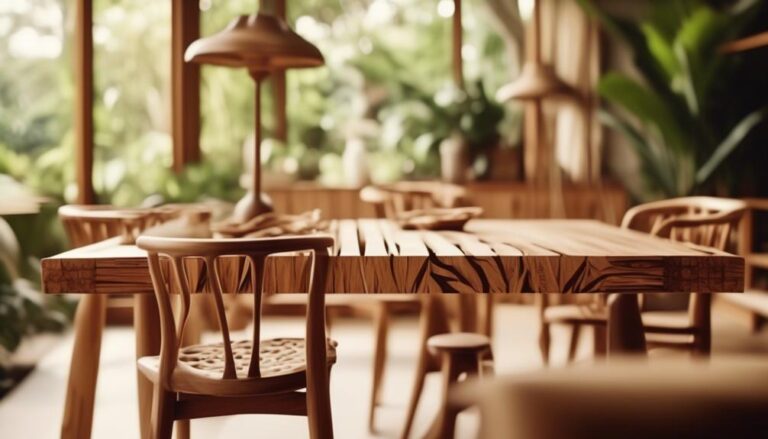In an era where the market is flooded with generic, mass-produced furniture, discerning homeowners and decor enthusiasts are on a quest for pieces that tell a story, embodying both function and artistry.
South African handcrafted wooden tables stand as a testament to this quest, offering a unique blend of cultural richness and unparalleled craftsmanship. For those seeking furniture that transcends the ordinary, these tables promise an infusion of soulful aesthetics and enduring quality into their living spaces.
Crafted with meticulous attention to detail, these tables are born from a tradition steeped in diverse African cultures and woodworking mastery. The use of indigenous woods like mahogany and ebony not only lends authenticity to each piece but also highlights a commitment to sustainability.
As you navigate the choices for your home, the allure of customization and the eco-conscious ethos of these creations speak directly to the heart of your decor aspirations. By choosing a South African handcrafted table, you're not just selecting a piece of furniture; you're embracing a piece of heritage.
Let's delve deeper into what makes these tables a true reflection of both artistry and sustainability, ensuring your interior spaces resonate with character and conscience.
Local Artisans' Expertise in Joinery
Local artisans in South Africa exhibit exceptional expertise in joinery, showcasing their mastery in traditional wood carving methods passed down through generations. Their skill and craftsmanship are evident in the intricate designs and patterns seen in Bamileke, Senufo, and Ashanti wood carvings. These artisans demonstrate their expertise by working with various types of African hardwoods, such as mahogany, iroko, and ebony, which are known for their durability and beauty.
The art of joinery is deeply rooted in South African culture and is a significant part of the country's cultural heritage. Local artisans take great pride in preserving this heritage through their handcrafted wooden tables. Each piece is a testament to their passion for their craft and their dedication to producing unique and visually captivating furniture.
The joinery expertise of South African artisans is not limited to the creation of functional pieces; it also extends to sustainability practices. These artisans prioritize using naturally felled trees, repurposing them into stunning wooden tables. This commitment to sustainability not only showcases their respect for the environment but also adds an extra layer of authenticity to their work.
South African handcrafted wooden tables are truly unique, reflecting the rich history of African craftsmanship and the skill of local artisans. These tables are more than just pieces of furniture; they are a symbol of belonging, connecting individuals to the cultural heritage and traditions of South Africa.
Use of Indigenous South African Wood Species
Indigenous South African wood species play a vital role in the creation of exquisite handcrafted wooden tables, showcasing the natural beauty and sustainability of the region's rich flora. South Africa is home to a diverse range of trees that are carefully selected by skilled artisans to create unique pieces of furniture. These indigenous woods not only contribute to the aesthetic appeal of the tables but also reflect the cultural heritage and traditions of the African people.
The use of indigenous South African wood species in the crafting of handcrafted wooden tables ensures that each piece is one-of-a-kind and carries a sense of authenticity. These woods are often sourced sustainably, respecting the delicate balance of nature and minimizing environmental impact. The table below highlights some of the prominent indigenous wood species used in South African furniture making:
| Wood Species | Characteristics | Common Uses |
|---|---|---|
| Kiaat | Rich, warm tones | Coffee tables, dining tables |
| Yellowwood | Durable and dense | Desks, side tables |
| Stinkwood | Dark, rich grain | Cabinets, bookshelves |
These woods, with their unique characteristics, contribute to the overall quality and durability of South African handcrafted wooden tables. The intricate designs and carvings, inspired by traditional African furniture and craftsmanship, further enhance the cultural significance of these pieces. By incorporating indigenous wood species into their creations, South African artisans are able to create furniture that not only captures the essence of Africa but also tells a story of the land, its people, and their customs.
Incorporation of Traditional African Design Elements
The rich heritage of African wood carving traditions seamlessly infuses the handcrafted wooden tables of South Africa, incorporating traditional design elements that celebrate the cultural significance and artistic craftsmanship of the region. These design elements are drawn from various African wood carving traditions, each with its distinct style and symbolism.
For example, the intricate wood carving tradition of the Bamileke people of Cameroon inspires the ornate patterns and motifs found on South African handcrafted wooden tables. These patterns showcase the cultural heritage of the Bamileke people and add a touch of elegance and sophistication to the furniture pieces.
Similarly, the Senufo wood carving tradition from West Africa influences the design of South African wooden tables, with its meaningful symbols and designs reflecting the rich cultural and religious beliefs of the region. The use of durable and long-lasting Iroko and mahogany wood ensures that these tables not only serve as functional furniture but also as a testament to the artistic craftsmanship of the African wood carvers.
Furthermore, the Ashanti wood carvings, known for their black stained finish and decorated with meaningful designs and symbols, are also incorporated into the design of South African handcrafted wooden tables. These designs pay homage to the cultural and historical significance of the Ashanti people, adding a touch of cultural heritage to any dining room or interior design.
In addition, the Dogon people of Mali inspire the carving of doors on South African wooden tables. These doors feature intricate symbols and figures that represent the family, beliefs, and history of the individuals, serving a protective function against bad spirits and enemies.
Incorporating these traditional African design elements into the handcrafted wooden tables of South Africa not only adds a unique and authentic touch to any home decor but also celebrates the rich cultural heritage of the region.
Customization to Fit Individual Preferences
Customization to fit individual preferences allows for the creation of handcrafted wooden tables that are uniquely tailored to each customer's specific design preferences and requirements. South African artisans take great pride in their ability to customize furniture, ensuring that every piece reflects the individuality of its owner.
Here are three ways in which customization plays a significant role in the creation of South African handcrafted wooden tables:
- Personalized Design Elements: Through customization, customers can incorporate personalized design elements into their tables. Whether it is a unique pattern, intricate carving, or a specific shape, artisans can bring any design idea to life.
- Size and Shape Flexibility: South African furniture makers understand that not every space is the same. They offer the flexibility to customize the size and shape of the table to perfectly fit the customer's requirements, ensuring it complements the room's layout.
- Custom Finishes and Detailing: The customization process extends to the finishes and detailing of the table. Customers can choose from a range of finishes, from natural wood tones to vibrant colors, as well as select specific detailing options to match their personal style and existing decor.
Sustainable and Eco-friendly Production Practices
With a steadfast commitment to sustainability, South African artisans exemplify their dedication to eco-friendly production practices through their creation of handcrafted wooden tables. These tables are not only visually stunning but also emphasize the importance of preserving the environment. South Africa's rich and diverse natural resources provide the perfect foundation for their sustainable furniture design.
One example of sustainable production practices can be seen in Phases Africa's tree root tables. These tables are made from African wooden tree roots that are sourced from naturally felled trees. By utilizing wood that would otherwise go to waste, these artisans are able to create unique pieces of furniture while minimizing environmental impact.
To further enhance the eco-friendly nature of their designs, these handcrafted wooden tables are often complemented with glass tops. Not only does this add to their visual allure, but it also serves to showcase the natural beauty of the wood while protecting it for years to come.
The use of tree root furniture aligns with sustainable and globally recognized interior design trends. It not only provides a unique and artistic touch to any space but also contributes to the preservation of South Africa's cultural heritage and artistic traditions.




